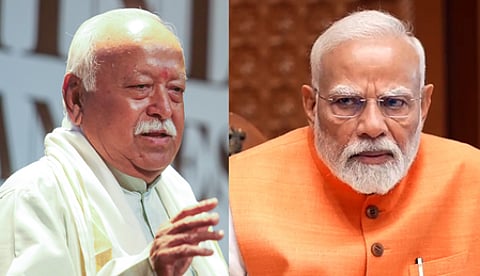Retirement at 75? India RSS chief Bhagwat’s comment stirs BJP succession talk
With Modi turning 75, speculation grows about succession plans — and Sangh’s role in them

Mohan Bhagwat, the paterfamilias of the Sangh Parivar and the Sarsanghchalak (chief) of the Rashtriya Swayamsevak Sangh (RSS) — the mothership of the BJP — repeated a fervent article of faith of the organisation, saying that “leaders should retire at 75”. Bhagwat was speaking at a book release function in Nagpur, where the Sangh headquarters is also located, on June 11.
Bhagwat was speaking in Marathi but switched to Hindi to make this important point, ensuring his comments were widely understood and leaving no room for misinterpretation.
Opposition speculation
Bhagwat’s comments drew feverish opposition speculation because Prime Minister Narendra Modi turns 75 in September — just like Bhagwat himself. Bhagwat’s birthday is September 11, and Modi was born six days later on the 17th. The opposition claimed that Bhagwat was giving a public nudge to Modi, with Abhishek Singhvi of the Congress saying that “preaching without practice is always dangerous. It is unprincipled that the Margdarshak Mandal was given compulsory retirement applying the 75 age limit, but indications are clear that the present dispensation will be given an exemption from this rule.”
Singhvi was referring to what is termed the “old age home” of the BJP, where founder leaders such as L.K. Advani and Murli Manohar Joshi (both BJP stalwarts) were consigned when Modi became Prime Minister in 2014. The body was supposed to be a guide to the BJP, but it has not even met once and was widely seen as a way to put senior and inconvenient leaders out to pasture.
The BJP as a party has no formal age limit for leadership. Indian leaders across the political spectrum find it notoriously difficult to retire, often having no interests beyond climbing the greasy pole of politics.
To retire or not to retire?
While the opposition was gleeful, BJP leaders were also abuzz — but in a private and circumspect fashion. Publicly, they all maintained that no retirement rule applied to their maximum leader, Modi. The “Modi exception” is apparent in Sangh politics, and even the RSS wouldn’t dare, publicly or privately, to ask the most successful leader it has produced (three-term Gujarat chief minister and three-term prime minister of India) to retire.
Modi has given the RSS a kind of heft in the Indian political establishment that the four-time banned organisation could only have dreamed of. The RSS certainly has no plans to pull the switch on its political unicorn, Modi.
So what did Bhagwat mean? As astute readers of SWAT analysis know, politics is the art of reading between the lines. So first of all, was Bhagwat referring to self-retirement? The post of Sarsanghchalak is normally held for life. Only three RSS chiefs have voluntarily stepped down due to serious health concerns: Raju Bhaiya, Balasaheb Deoras, and K.S. Sudarshan.
Bhagwat, a veterinarian by profession, is physically fit and remains active in managing Sangh affairs and the ever-growing profile of the RSS.
Exception in place
I spoke to four senior BJP leaders and two Sangh functionaries for this analysis. They were all unanimously clear: a Modi retirement exception is firmly in place, and he will lead the BJP electorally for as long as he wishes.
The BJP leaders — wary of going on record on this most sensitive subject — said that the RSS chief’s public comments had triggered talk of a Bhagwat succession plan within the BJP. This was public succession planning being signalled to the Sangh. It also indicated that the RSS was reclaiming a significant share of power it had ceded to Modi, especially after he reset the relationship with the parent organisation following two consecutive majorities.
Recall BJP President J.P. Nadda’s comments that the BJP didn’t need the RSS anymore to win elections — followed soon after by the lack of a clear majority at the Centre. Many fence-building efforts were made post that hasty Nadda remark and the disappointment of the results. After a period of sulking and pointed remarks from Bhagwat (notably, that ego cannot be bigger than the organisation), the RSS came back on board during the Haryana and Maharashtra elections.
RSS influence
Now, the RSS is exerting clear influence on the choice of the next BJP president, who is to be announced later this month. It has used its veto to torpedo several Modi-backed choices. The BJP president will be the bridge between the political face and the larger Sangh — and the RSS is clear that it must have the final say. This has delayed the appointment and its announcement.
Despite what the naysayers say, the Sangh’s internal human resource policies have yielded prudent results, consistently grooming the next generation of leadership. In contrast stands a moribund opposition, whose chief, Mallikarjun Kharge, is 80 years old.
Succession planning in the BJP, post-Modi era, centres around two figures: Union Home Minister Amit Shah, who turned 60 in April, and Yogi Adityanath, the three-term Chief Minister of Uttar Pradesh, who is 53.
According to Sangh insiders, both Shah and Yogi are “Hindutva icons” and central to the long-term Hindutva project. Yogi leads the state with 80 Lok Sabha seats — the route to power in New Delhi — and now has critical administrative experience. Shah is widely considered the most capable and strategic election manager in the history of Indian politics.
Interestingly, Shah recently spoke publicly about his post-retirement plans of studying the Vedas and pursuing natural farming, though he left the date of his retirement unspecified.
Come the announcement of the new BJP president, and come September, we may know more. For now, like all successful organisations, the Sangh is quietly planning succession. As with most things, our clueless Indian opposition could take a few notes.
Sign up for the Daily Briefing
Get the latest news and updates straight to your inbox






